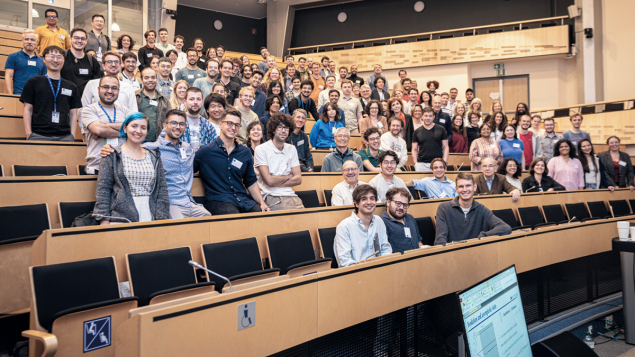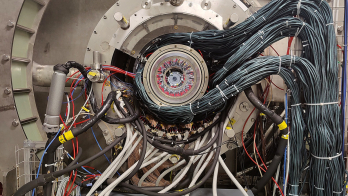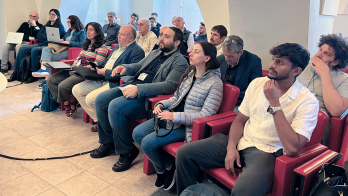
Around 150 researchers gathered at CERN from 1 to 5 September to discuss the origin of the observed matter–antimatter asymmetry in the universe, the source of its accelerated expansion, the nature of dark matter and the mechanism behind neutrino masses. The vibrant atmosphere of the annual meeting of the Invisibles research network encouraged lively discussions, particularly among early-career researchers.
Marzia Bordone (University of Zurich) highlighted central questions in flavour physics, such as the tensions in the determinations of quark flavour-mixing parameters and the anomalies in leptonic and semileptonic B-meson decays (CERN Courier January/February 2025 p14). She showed that new bosons beyond the Standard Model that primarily interact with the heaviest quarks are theoretically well motivated and could be responsible for these flavour anomalies. Bordone emphasised that collaboration between experiment and theory, as well as data from future colliders like FCC-ee, will be essential to understand whether these effects are genuine signs of new physics.
Lina Necib (MIT) shared impressive new results on the distribution of galactic dark matter. Though invisible, dark matter interacts gravitationally and is present in all galaxies across the universe. Her team used exquisite data from the ESA Gaia satellite to track stellar trajectories in the Milky Way and determine the local dark-matter distribution to within 20–30% precision – which means about 300,000 dark-matter particles per cubic metre assuming they have mass similar to that of the proton. This is a huge improvement over what could be done just one decade ago, and will aid experiments in their direct search for dark matter in laboratories worldwide.
The most quoted dark-matter candidates at Invisibles25 were probably axions: particles once postulated to explain why the strong interactions that bind protons and neutrons behave in the same way for particles and antiparticles. Nicole Righi (King’s College London) discussed how these particles are ubiquitous in string theory. According to Righi, their detection may imply a hot Big Bang, with a rather late thermal stage, or hint at some special feature of the geometry of ultracompact dimensions related to quantum gravity.
The most intriguing talk was perhaps the CERN colloquium given by the 2011 Nobel laureate Adam Riess (Johns Hopkins University). By setting up an impressive system of distance measurements to extragalactic systems, Riess and his team have measured the expansion rate of the universe – the Hubble constant – with per cent accuracy. Their results indicate a value about 10% higher than that inferred from the cosmic microwave background within the standard ΛCDM model, a discrepancy known as the “Hubble tension”. After more than a decade of scrutiny, no single systematic error appears sufficient to account for it, and theoretical explanations remain tightly constrained (CERN Courier March/April 2025 p28). In this regard, Julien Lesgourgues (RWTH Aachen University) pointed out that, despite the thousands of papers written on the Hubble tension, there is no compelling extension of ΛCDM that could truly accommodate it.
While 95% of the universe’s energy density is invisible, the community studying it is very real. Invisibles now has a long history and is based on three innovative training networks funded by the European Union, as well as two Marie Curie exchange networks. The network includes more than 100 researchers and 50 PhD students spread across key beneficiaries in Europe, as well as America, Asia and Africa – CERN being one of their long-term partners. The energy and enthusiasm of the participants at this conference were palpable, as nature continues to offer deep mysteries that the Invisibles community strives to unravel.








